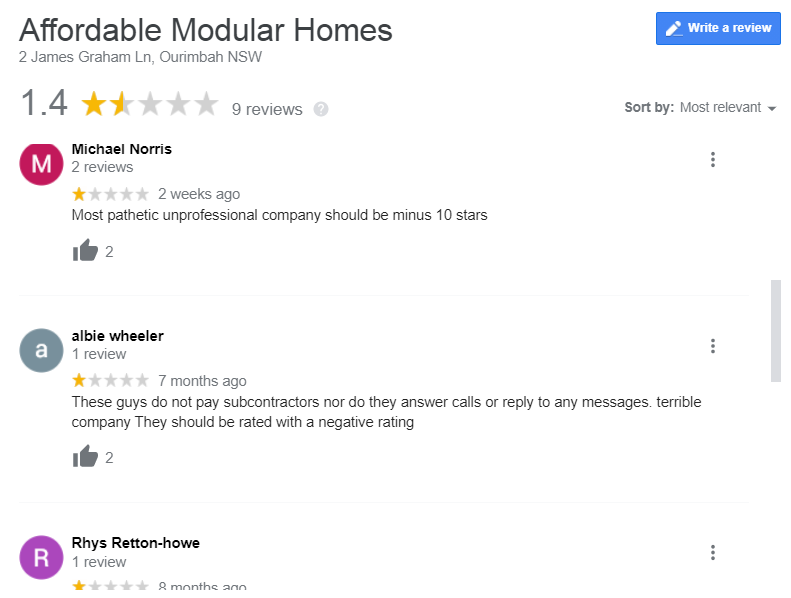In a previous blog post How Should You Structure Progress Payments For Your Granny Flat?, we wrote about progress payments. The schedule of progress payments for the construction of your granny flat will be outlined in the building contract. Before you sign the granny flat building contract, however, there are several things to ask your builder to ensure they’re really the best person for the job.
1. Is this builder right for the job?
This may seem obvious, but sometimes when you’re talking with lots of different builders, it’s easy to overlook this important first step. In determining whether your builder is right for the job, find out whether the builder is allowed to build in your state and whether they have the skills necessary for the job.
2. Does your builder have the right credentials?
Find out how many projects the builder currently has under construction, how long they’ve been in business, whether they’ve previously been declared bankrupt, or if they have any past or current building disputes.
3. How will you communicate?
Does your builder have systems in place to keep you updated? Will they call, email, text you with updates, and if so, how often? A builder who doesn’t have a plan to communicate with clients regularly generally won’t communicate with them at all, and this is a problem.
4. Has everything in the contract been specified?
The building contract must thoroughly outline the work to be completed, the commencement dates, total cost, progress payment schedule, the builder’s license and necessary insurances, cooling off periods, and so forth. To find out exactly what your building contract should contain, visit the regulatory body in your state, such as the Department of Fair Trading in NSW.
5. Do you have allowances in your contract?
Are there allowances for prime cost and provisional sum items? Prime cost items are for the supply of materials only, while provisional sum items are for the supply of the materials and labour costs. Has your builder outlined how the amounts you will pay have been calculated? If you’re uncertain, you should ask your builder or an independent consultant to explain it to you.
As a general rule of thumb, though, wherever possible avoid prime cost items. Prime cost items refer to your selections of fittings and fixtures (i.e., appliances, taps, tiles, etc) that are listed in the contract but don’t have an identified price, because the builder couldn’t determine the make, model or exact price of the item at the time the contract was signed.
Like prime cost items, you should also try to avoid provisional sum items, as well. A provisional sum is used when the builder cannot give an exact price for the proposed work at the time the contract is signed. It’s quite common for excavation work to be included as a provisional sum item, for instance, however the real cost could rise significantly. Should the builder list scaffolding as a provisional sum, for example, but the project is delayed, the additional cost could run into thousands.
6. Who owns the copyright?
Sometimes it may be tempting to take the design provided to you by one builder, and have someone else build it for you at a lower price. However, each building company owns the copyright to their designs and plans, so that if you sign an agreement and pay for a particular plan, you cannot have the design built by someone else.
In fact, this practice is illegal in Australia, and can result in legal action for damages, as well as an injunction to halt the construction of your granny flat. If you do not own the copyright to your design you will be liable for a ‘loss of profit’ to the copyright owner should you decide to use the design and build with someone else. This includes design ideas, which means that getting a design redrawn will not protect you from legal action.
Example: Affordable Modular Homes
Affordable Modular Homes had an office and showroom in Ourimbah on the New South Wales Central Coast and in a visit to their showroom several years ago one of our contributors found a large range of very interesting designs to suit many circumstances where a granny flat can be used for extra income. The person that shared these designs and ideas retired from the company and the remaining owners were focusing on other areas of work that suited their existing business and preferences.
As a result it was hard for staff at the building company to keep up with the workload, finer details were missed and timeframes dragged out. As a result clients didn’t get everything they expected and accounts payable for contractors we spoke to started to stretch out and become unacceptable. These circumstances make it very hard for any company to continue to operate efficiently and considering that these companies don’t make a huge profit margin there is little room for errors.
The last time we visited the site they were no longer there. We haven’t tried to contact the company but it stood as a good example of a company that had fantastic designs but where the focus changed.
For more information about building contracts and your rights, visit the state regulatory body in your state (the Department of Fair Trading in NSW, for example). For more property news, insights and analysis, continue reading our blog. Alternatively, subscribe below to have our latest blogs delivered straight to your inbox.
As seen in..
Our educational blogs are designed to help you understand each of the steps involved in selling your property so whether you choose to work with a real estate agent or do it yourself you'll understand the work involved and be more efficient and aware of what you need to do. Our articles have been seen in these major online news and information portals..

Get genuine and objective information about what's important when selling your property - whether through an agent or by yourself.
Built by 123ezy


